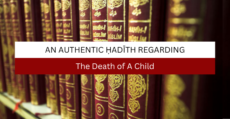Reference: Badāi’ al-Fawāid 3/133
…Likewise the statement [Prophet] Ibrāhῑm al-Khalῑl to his father,
{O my father, why do you worship that which neither hears nor sees, and will not benefit you at all?} [19:42]
He began addressing him by mentioning his fathers’s status (by saying: “O my father”), demonstrating respect and reverence. He did not call him by his name.
Then he presented his objection as a question, saying: {why do you worship that which does not hear…}, rather than issuing a direct command such as saying: “do not worship…”.
Then he said,
{O my father, indeed there has come to me of knowledge that which has not come to you…} [19:43]
He did not say to him, “you are ignorant, and you have no knowledge”. He avoided that expression and chose to use a more gentle phrase, more refined to convey the same meaning.
He then said,
{O my father, indeed I fear that a punishment from the ar-Raḥmān (the most-merciful) will touch you, and you will become to Shaytan a companion} [19:45]
He attributed the fear to himself – not his father – just as a compassionate person would do, being scared for the one he cares deeply about.
He said, {a punishment… will touch you} he used the wording “touch” which is more softer and delicate word; and he mentioned {a punishment} in its singular indefinite form; and mentioned {ar-Raḥmān} (the most-merciful) rather than referring to Allāh using his name al-Jabbār (the compeller), or al-Qahhār (the Subjugator).
So, which speech is softer and more gentle than this?!
قول لين من نبي عظيم لأبيه الكافر
المرجع: بدائع الفوائد 3/ 133
وكذلك قول إبراهيم الخليل لأبيه:
{يا أبت لم تعبد ما لا يسمع ولا يبصر ولا يغني عنك شيئا}
فابتدأ خطابه بذكر أبوته الدالة على توقيره، ولم يسمه باسمه.
ثم أخرج الكلام معه مخرج السؤال، فقال: {لِم تعبد ما لا يسمع}، ولم يقل له على سبيل النهي : لا تعبد.
ثم قال: {يا أبت إني قد جاءني من العلم ما لم يأتك} فلم يقل له: أنت جاهل، لا علم عندك، بل عدل عن هذه العبارة إلى ألطف عبارة تدل على هذا المعنى.
ثم قال: {يا أبت إني أخاف أن يمسك عذاب من الرحمن فتكون للشيطان وليًا}، فنسب الخوف إلى نفسه دون أبيه، كما يفعل الشفيق الخائف على من يشفق عليه.
وقال: {يمسك عذاب من الرحمن} فذكر لفظ المس الذي هو ألطف من غيره، ثم نكّر العذاب، ثم ذكر الرحمن، ولم يقل الجبار، ولا القهار، فأي خطاب ألطف وألين من هذا.



